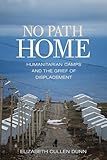No Path Home : Humanitarian Camps and the Grief of Displacement / Elizabeth Cullen Dunn.
Material type: TextPublisher: Ithaca, NY : Cornell University Press, [2018]Copyright date: ©2017Description: 1 online resource (268 p.) : 16 b&w halftones, 3 b&w line drawings, 1 mapContent type:
TextPublisher: Ithaca, NY : Cornell University Press, [2018]Copyright date: ©2017Description: 1 online resource (268 p.) : 16 b&w halftones, 3 b&w line drawings, 1 mapContent type: - 9781501712517
- Humanitarian assistance -- Georgia (Republic)
- Internally displaced persons -- Georgia (Republic)
- Refugee camps -- Georgia (Republic)
- South Ossetia War, 2008 -- Refugees
- Anthropology
- Humanities & Human Rights
- Political Science & Political History
- SOCIAL SCIENCE / Anthropology / Cultural & Social
- humanitarian system, displacement, international humanitarianism, Georgian government, survival, politics of living, existential anthropology
- 362.8783094758 23
- HV640.4.G28 .D866 2017
- online - DeGruyter
| Item type | Current library | Call number | URL | Status | Notes | Barcode | |
|---|---|---|---|---|---|---|---|
 eBook
eBook
|
Biblioteca "Angelicum" Pont. Univ. S.Tommaso d'Aquino Nuvola online | online - DeGruyter (Browse shelf(Opens below)) | Online access | Not for loan (Accesso limitato) | Accesso per gli utenti autorizzati / Access for authorized users | (dgr)9781501712517 |
Frontmatter -- Contents -- Note on Place Names in the South Caucasus -- 1. The Camp and the Camp -- 2. War -- Intertext 1: The Normal Situation -- 3. Chaos -- 4. Nothing -- Intertext 2: Void -- 5. Pressure -- 6. The Devil and the Authoritarian State -- Intertext 3: The State and the state -- 7. Death -- Intertext 4: Bright Objects -- 8. All That Remains -- Acknowledgments -- Notes -- References -- Index
restricted access online access with authorization star
http://purl.org/coar/access_right/c_16ec
For more than 60 million displaced people around the world, humanitarian aid has become a chronic condition. No Path Home describes its symptoms in detail. Elizabeth Cullen Dunn shows how war creates a deeply damaged world in which the structures that allow people to occupy social roles, constitute economic value, preserve bodily integrity, and engage in meaningful daily practice have been blown apart. After the Georgian war with Russia in 2008, Dunn spent sixteen months immersed in the everyday lives of the 28,000 people placed in thirty-six resettlement camps by official and nongovernmental organizations acting in concert with the Georgian government. She reached the conclusion that the humanitarian condition poses a survival problem that is not only biological but also existential. In No Path Home, she paints a moving picture of the ways in which humanitarianism leaves displaced people in limbo, neither in a state of emergency nor able to act as normal citizens in the country where they reside.
Mode of access: Internet via World Wide Web.
In English.
Description based on online resource; title from PDF title page (publisher's Web site, viewed 26. Apr 2024)


